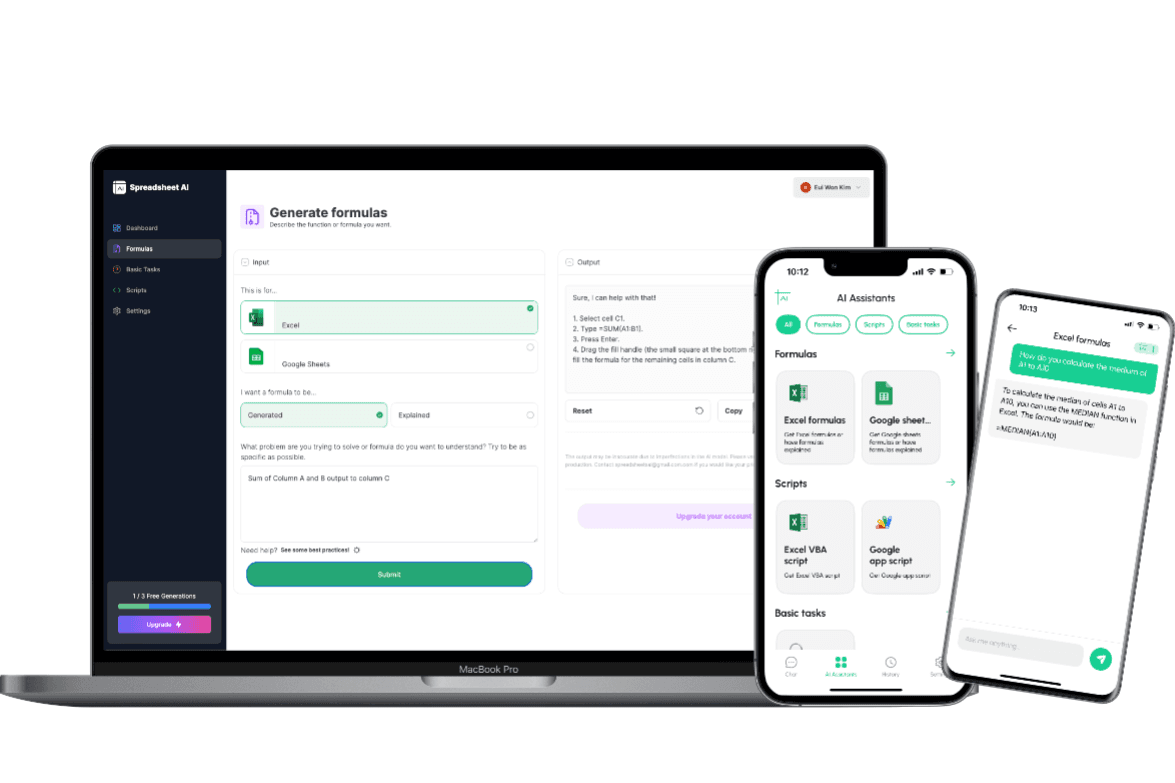Formula generator for MULTIPLY function
The MULTIPLY function is used to multiply two or more numbers together. It is equivalent to using the `*` operator in Excel. The function takes multiple arguments, which can be numbers, cell references, or other formulas, and returns the product of those values.
Formula generator
Spreadsheet AI is the #1 AI for generating and comprehending Excel and Google Sheets formulas. With its advanced capabilities, it goes beyond the basics by providing support for VBA and custom tasks. Streamline your spreadsheet with Spreadshee AI

How to generate an MULTIPLY formula using AI.
To obtain information on the ARRAY_CONSTRAIN formula, you could ask the AI chatbot the following question: “To obtain the MULTIPLY formula in Excel, you could ask the AI chatbot the following question: "What is the formula in Excel to multiply two numbers together?"”
MULTIPLY formula syntax
The MULTIPLY syntax in Excel is used to multiply two or more numbers together. It follows a simple structure: =MULTIPLY(number1, number2, ...) Here, "number1" and "number2" represent the numbers you want to multiply. You can include as many numbers as needed, separated by commas. The function will multiply all the numbers together and return the result. For example, if you want to multiply 5, 10, and 2 together, the formula would be: =MULTIPLY(5, 10, 2) The result would be 100, as 5 * 10 * 2 equals 100. Remember to use the correct syntax and ensure that the numbers are entered correctly to get accurate results.
Use Cases & Examples
In these use cases, we use the MULTIPLY function to calculate the product of values in a range.
Sales Revenue Calculation
Description
Calculates the total sales revenue by multiplying the unit price with the quantity sold.
Result
MULTIPLY(UnitPrice, QuantitySold)
Gross Profit Calculation
Description
Calculates the gross profit by multiplying the sales revenue with the gross profit margin.
Result
MULTIPLY(SalesRevenue, GrossProfitMargin)
Compound Interest Calculation
Description
Calculates the compound interest by multiplying the principal amount with the interest rate and the number of periods.
Result
MULTIPLY(PrincipalAmount, INTEREST(InterestRate, NumberOfPeriods))
AI tips
Enhance Your Excel Efficiency with AI Tips: Discover our innovative Excel add-in feature, ‘AI Tips.’ Streamline your workflow and boost productivity as AI-powered suggestions offer real-time insights for optimal spreadsheet organization, data analysis, and visualization. Elevate your Excel experience with intelligent recommendations tailored to your unique needs, helping you work smarter and achieve more.
Provide Clear Context
When describing your requirements to the AI, provide clear and concise context about the data you have, the specific task you want to accomplish, and any relevant constraints or conditions. This helps the AI understand the problem accurately.
Include Key Details
Include important details such as column names, data ranges, and specific criteria that need to be considered in the formula. The more precise and specific you are, the better the AI can generate an appropriate formula.
Use Examples
If possible, provide examples or sample data to illustrate the desired outcome. This can help the AI better understand the pattern or logic you are looking for in the formula.
Mention Desired Functionality
Clearly articulate the functionality you want the formula to achieve. Specify if you are looking for lookups, calculations, aggregations, or any other specific operations.
FAQ
Frequently Asked Questions
- To use the MULTIPLY function in Excel, you can simply enter the formula =MULTIPLY(number1, number2), replacing number1 and number2 with the values you want to multiply.
- Yes, you can use the MULTIPLY function to multiply more than two numbers. Simply include additional numbers separated by commas within the parentheses.
- If one of the numbers in the MULTIPLY function is a negative value, the result of the multiplication will also be negative.
- Yes, you can use cell references as arguments in the MULTIPLY function. Simply replace number1 and/or number2 with the cell references that contain the values you want to multiply.
- There are no specific limitations to using the MULTIPLY function in Excel. However, keep in mind that it can only perform basic multiplication and may not be suitable for complex calculations.